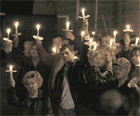Yet, for the most part, our society ignores it. Considers it a weakness. So, people hide it under the bed, until it's impossible to hide any longer.
And by then, it's sometimes too late.

During the last few weeks, two miners from the Sago mine in West Virginia committed suicide. From all accounts, these men were not responsible for the tragedy that occurred this past Winter, and were not family members of the men who died in the cave-in of that mine. But, they suffered, nonetheless. With grief and sadness. And with guilt.
But, who was listening?
Well, not me...
Sadly, I didn't even know about the suicides until this morning, when I heard it mentioned on Hoppy Kercheval's Metro News radio talk show. I'm notorious for ignoring news (especially local news) since I dropped out. But Lord, how did I miss that story?
 One reason: The miners weren't this guy.
One reason: The miners weren't this guy.Terrell Owens tries to overdose, and Breaking News flashes across my computer. Co-workers talk about it in the hallways, at the water cooler and while waiting on copies. Some guys even quickly pulled up their Fantasy Football League pages, to see what substitute they could get off the Waivers List.
We couldn't escape this news.
Although the majority of the most severe forms of depression can be treated, most people who have depression do not seek treatment. It's considered an admission of weakness, and American society doesn't value weakness. The guy who pulled himself up by his bootstraps? He's a hero. Need to talk to someone about the grief you are experiencing? Loser.
No one wants to be that guy.
One in ten. That translates to nearly 21 million American adults living with some form of depression. The economical problems this causes the world is significant; the emotional distress the disorder causes each individual who lives with it is overwhelming.
Who knows how this thing with TO will turn out? I do know this: We gotta learn from the TO's, so that the Sago-type tragedies no longer happen.
UPDATE: Yeah, I know. TO says it was an accident, and not an attempt at suicide. That he has nothing to be depressed about.
Doesn't change a thing.
5 comments:
Let's not forget how many people are impacted by those 21 million American adults. Like a spider web each of those people affect others who are in their circles of friends and associates magnifying the problem somewhat. Think of any day when someone in the office is having a very bad day and how it affects everyone else who has to work with that person. Think of how that would affect the person's family and close friends as well. Now multiply that by 21 million.
Exactly. It is a pervasive problem, and one we ignore pervasively as well.
"before I dropped out..."
What are you alluding to?!?!
I've mentioned it a few times, Anonymous. Red states vs. blue states was killin' me. News about tragedies and crime was making me a wreck. So, I dropped out. Lost the passion. Went back to reading comic books.
I see a lot of depressed people. I was marveling that my 4 best female friends in high school, all of them were being treated for depression. So, also, is one of my sisters.
Me, I just want a cigarette...
Something else, there seems to be a cycle to it. I seem to notice more down people and hear about more suicides, attempted suicides and such all at once.
Post a Comment